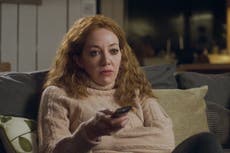Surviving Death: How Netflix’s new series speaks to my lockdown anxieties about dying
Ruminating on mortality has had Micha Frazer-Carroll pondering one of the eternal questions, and, she says, the new six-part documentary is reassuringly scientific


For as long as I can remember, I’ve been kept up at night by thoughts of death. Throughout my adult life, though, these have always been tempered by busy working days and bustling nights with friends. Predictably, when lockdown struck last year, stripping all those everyday distractions away, my morbid ruminations suddenly worsened. The daily death toll seemed to bring the reality of mortality into sharp focus, and it became harder to avoid these thoughts when I was spending so many of my (furloughed) days alone and unoccupied, constantly consuming the news. By the time the dark winter months rolled around, I was firmly on the path of deep philosophical questioning – and so, when I stumbled across the trailer for director Ricki Stern’s Surviving Death, the topic felt incredibly timely.
The six-part documentary series, which debuted on Netflix this week, asks the question that humans (including myself) have pondered for millennia: is there life after death? And despite its potentially sensationalist subject matter, the show takes a scientifically robust approach to the topic – always weighing up spirituality and supernaturalism with the voices of academics and researchers.
Episode one, which focuses on “near-death experiences” – that is, people who have been declared clinically dead, but returned to tell the tale – hinges upon perhaps the most gripping hook a documentarian could ask for. And the most fascinating part about the stories compared in the episode, from a doctor who “drowned” in a kayaking accident to an electrical engineer who “died” after a fall at work, is the coherence of their wide-ranging experiences. Some are pop culture cliches – a light, a tunnel, a deceased family member there to welcome you across to the other side – but each person describes them vividly and earnestly. Other reports dip into the realm of the superstitious; one woman claims she was forewarned of her eldest son’s untimely death during her out of body experience, and another, who flatlined during labour, claims she has been able to predict the future ever since.
If you’re a hardcore materialist atheist, this might be where you would usually check out. After all, we have all heard spooky stories of the supernatural before. But as a sort-of-agnostic person who’s open to persuasion, what kept me hanging on was the balanced incorporation of scientific evidence. So when it comes to near-death experiences, academics such as the University of Cambridge’s Peter Fenwick grapple with the dominant psychological theories surrounding these phenomena: for example, the suggestion that these vivid hallucinations and feelings of bliss result from oxygen deprivation in the brain.
According to Fenwick, who was initially a sceptic, but has now studied end-of-life phenomena for more than a decade, none of these hypotheses hold much water. What he does stress is that, while this by no means constitutes scientific evidence for the afterlife, there is still much that we do not understand about consciousness, particularly how it behaves during the dying process. So why not remain curious? As is suggested by 17th-century philosopher Blaise Pascal’s famous wager – that people should live as though God exists, because if it’s not true, the losses are small, but if it is true, the gains are infinite – what do you have to lose?
This level-headed, investigatory approach was definitely enough to persuade me to join the journey through the subsequent themed episodes, which look at mediumship, “signs” from the dead, sightings of dead people, and reincarnation. While I was initially cynical that the documentary could offer six hours of persuasive testimony, as the series unfolded, I started to feel as if that wasn’t necessarily the point. After all, the maxim offered by one interviewee in episode five – “for those who believe, no proof is necessary; for those who don’t believe, no proof is possible” – perfectly sums up the pointlessness of trying to “prove” that there is a life after death.
Instead, Stern starts to show us the merit in simply being open to other people’s experiences. Many of the people in the case studies, who believe that they have in some way or another connected to the dead, reveal they were former sceptics themselves, or that they still haven’t committed to a single interpretation of what they have been through. But they have all been, in some way, changed by their experiences of seeing, hearing, feeling or otherwise perceiving something extraordinary. Many no longer fear death. Others – for example the woman who claims her near-death experience gave her a sixth sense for danger – have lost their sense of humour. And others still say they gained a sense of closure through feeling closer to loved ones they had lost. Whatever the scientific explanation, these are incredibly profound outcomes.
Any work exploring life after death naturally has a serious ethical component, something you’ll be reminded of as the series goes on. Many of Stern’s case studies are people who are in the throes of grief – desperate to find solace through profitable services that can also be highly exploitative, like mediums. In episode three, we watch medium and instructor Philip Dykes awkwardly helm an unsuccessful session – feeling around in the dark for clues about the deceased person in question. It feels like a morbid version of Guess Who?, and it’s painful to watch the frustration and disappointment of the client, who longs to reconnect with his deceased father. The ethics of the issue are by no means left untouched – the show lays out the history of fraudulent mediums in great detail. But there are nonetheless moments where the scientific scrutiny lapses – and I almost found myself yearning for Louis Theroux to appear, so those who profit from grief could face a little more interrogation.
Ultimately, the documentary hasn’t wholly cured my fear of oblivion, or whatever comes next. But I would say that it has opened up my anxiety to genuine curiosity about what happens to our conscious minds when we die. For this reason, Surviving Death is significant during a time where many of us are thinking more about this taboo subject. It offers a fascinating, flexible and deeply human framework for thinking about death – something we all have a stake in.



Bookmark popover
Removed from bookmarks